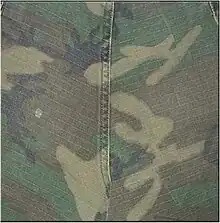United States Army Engineer Research and Development Laboratory
The United States Army Engineer Research and Development Laboratory (ERDL) was a United States Army Corps of Engineers research facility located at Fort Belvoir, Virginia.[1]

ERDL (M1948) pattern
History
The ERDL was formed in 1947 when the Army's Engineer Board was redesignated as the U.S. Engineer Research and Development Laboratory, or ERDL.[2]
Army Equipment Development milestones
Among other things, the ERDL was responsible for the creation of the ERDLator water treatment device in World War II, the ERDL woodland camouflage pattern in 1948, and the updated M1950 lensatic compass.[2]
The ERDL also established the first U.S. Army research group dedicated to night vision systems in 1954, called the Research and Photometric Section.[3]
Sources
- "GL History - Chapter 4". Archived from the original on 2012-02-09. Retrieved 2012-08-26.
- Pennington, John, History of the U.S. Army Engineer Topographic Laboratories 1920-1970, Ft. Belvoir, VA: Army Engineer Topographic Laboratories, AD-785 549, Nov. 1973
- Night Vision & Electronic Sensors Directorate - Fort Belvoir, VA Archived 2012-02-09 at the Wayback Machine
This article is issued from Wikipedia. The text is licensed under Creative Commons - Attribution - Sharealike. Additional terms may apply for the media files.